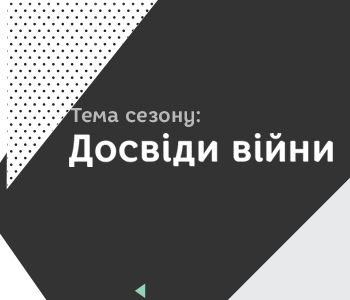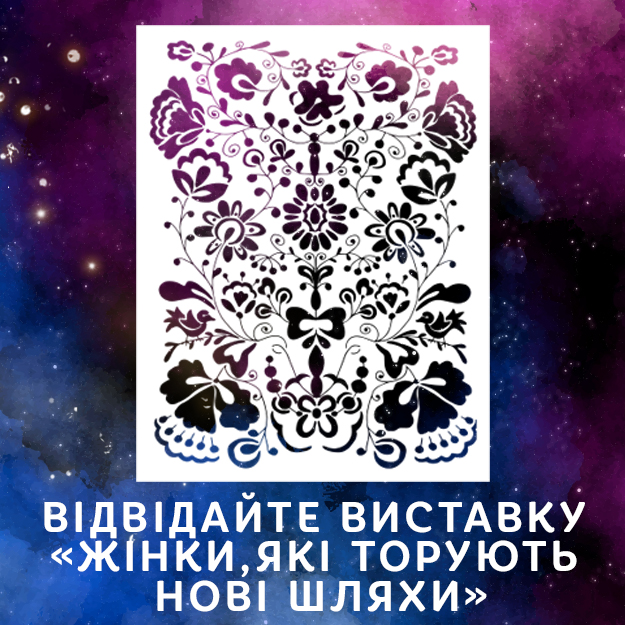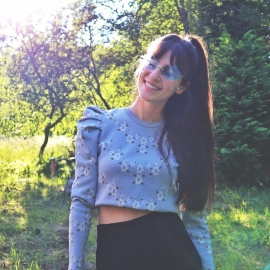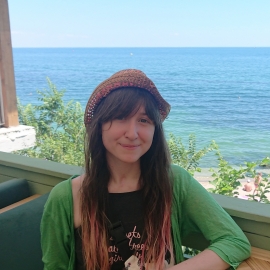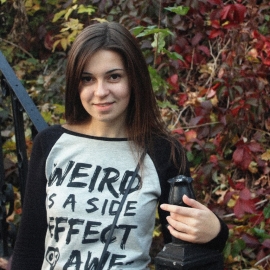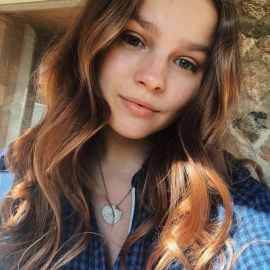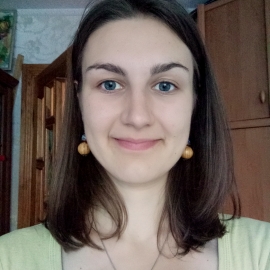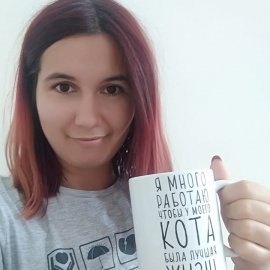The author of the texts and carvings is Olena Marchyshyna.
Madonna
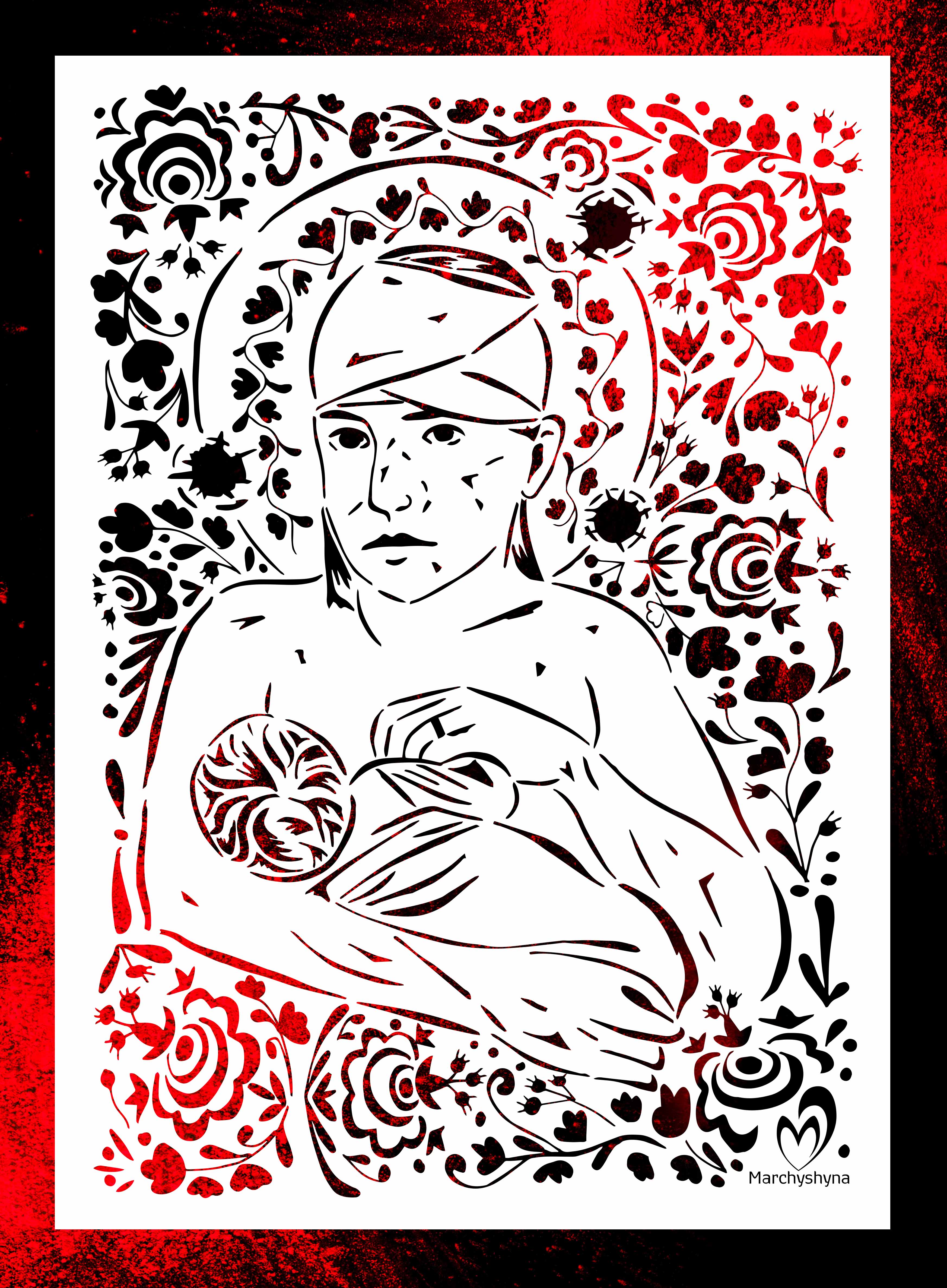
Each and every one of us has wounds and cuts now, pierced and cut by the war. They will not heal; they are bleeding. This pain must be heard.
This series of vytynanky (paper cutting artworks) will tell the story of how the war has changed Ukrainian men and women whose souls are now forever “cut.”
The first story is about the new Ukrainian Madonna.
This image unites all mothers. Those who left Ukraine and went abroad, rescuing children, those who remained to protect them every day at home in difficult conditions, those whose children are defending Ukraine from the Russian plague. Everyone…
Nature cannot wait for the end of the war. Children will come to this world in spite of everything. Children of the war… My father was a child born during World War II. And now countless children are going through the same thing. My friend gave birth to a daughter three weeks ago and called her Myra. The word sounds like “peace” in Ukrainian — quite symbolic, though they’d picked it back in the summer.
I remember the first days of my motherhood, something that I’d been dreaming of and wanted for so long. How I was getting ready, how much peace and care I needed... my body resonates with pain now that I think what babies and their mothers are going through right now. The mothers who were waiting for this moment, lovingly chose clothes, cribs, and strollers. Decorated the nursery, selected a maternity hospital. And now they are trying to survive and protect what is most precious to them. This shouldn’t be happening anywhere in the world.
This vytynanka is based on a mom called Olha. During the explosion in Vynohradar area in Kyiv, she suffered multiple wounds from shards of glass cutting through her skin, but she managed to cover her child with her own body.
When the war began, her daughter Viktoria was just two weeks old, so the family was afraid to take a long unpredictable trip westward. It's scary to imagine breastfeeding a child to the sound of sirens and explosions. And how can a mother keep a valuable thing like breastfeeding at this difficult time?
On March 18, the explosions were getting closer and closer to their home. And when at 8 in the morning, Olha took her daughter in her arms to feed her, an explosion erupted right there. The mother covered little Vika with her body from numerous shards of glass. Viktoria remained unharmed. Olha had 25 cuts.
The blood from her wounds is on the hands of every Russian.
Angels of the frontline
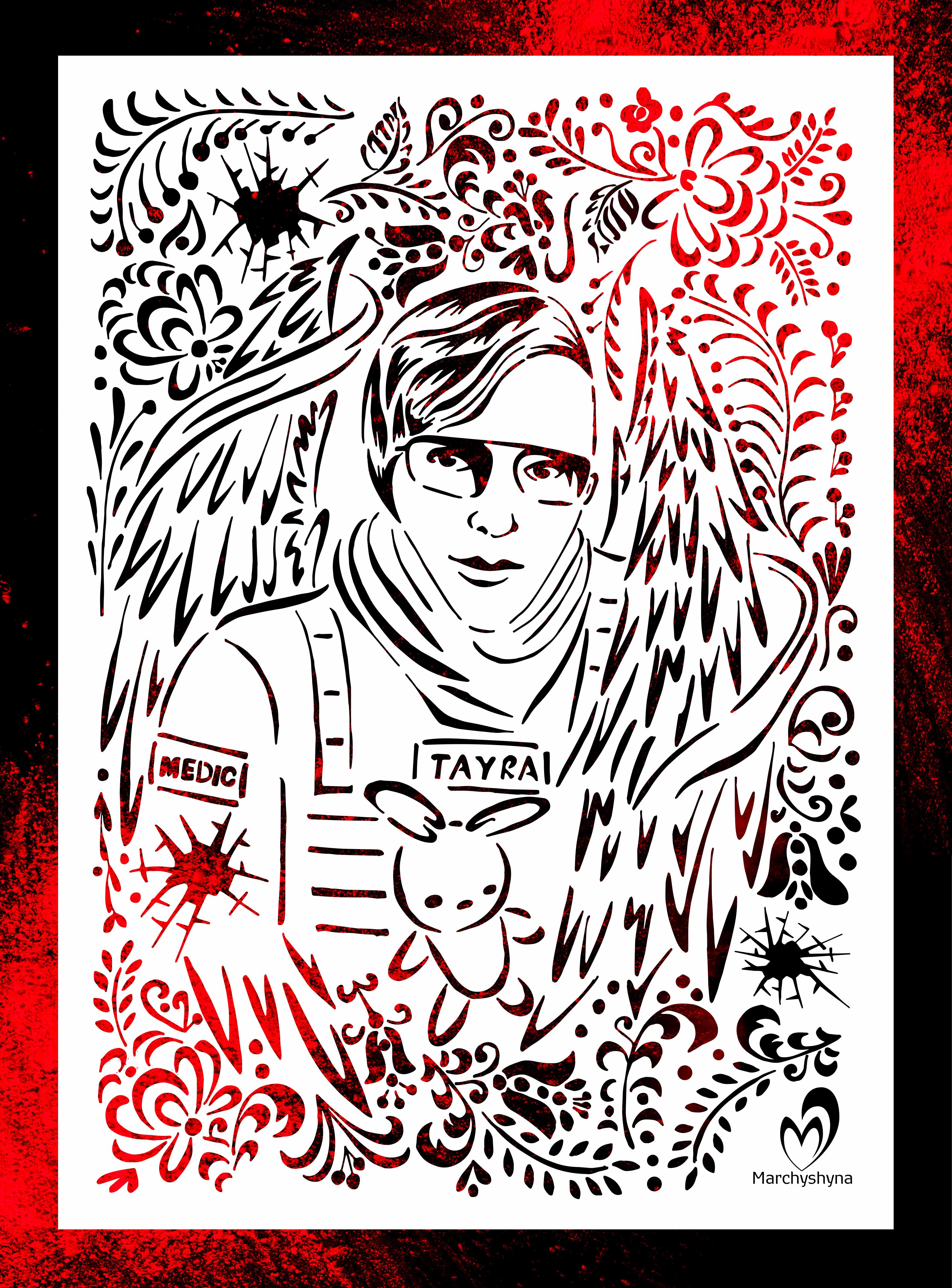
I know what burnout is. I know how difficult it is in “regular” everyday life: when you feel empty inside; when you lose the meaning of why you are here. This can happen to absolutely anyone. And when there’s war... Nothing about the war is easy.
I am constantly thinking about paramedics, whose weapon is the ability to risk their lives and saving others. And in addition, they have a huge responsibility and mental burden. How do they handle it? What helps them stay strong day in, day out?
Who are these people? Medics, trainers, lawyers, scientists, journalists, programmers, translators, singers. What makes them abandon their regular lives and become indomitable angels — guardians of the front?
Every day, they deal with something the vast majority of us never sees. And while it may be difficult for us to imagine what real war is, paramedics have a very clear picture.
Can you be ready to see death? And if it's dozens of deaths? And if dozens of deaths every day?
I have a paramedic friend who has been at war with Russia almost from the very beginning, the real beginning, in 2014. For me, this person is the embodiment of unbreakable reliability. And although we saw each other live at most three times, I would entrust my life and the lives of my children to her with my eyes closed. She is exactly such an angel of the front. I can't rationally explain my boundless sense of security in communicating with her. I just painfully want to hug her now.
I am an ordinary person; I have seen death from old age, death from disease. It is very painful and very scary. But what is it like to see a military servant, be it a man or a woman, die on the frontline — a young person with their whole life ahead of them? When you see your friend-in-arms, who was always there for you, lose their life? When you see the deaths of civilians, adults and children, who found themselves in an inferno? Nothing about the war is easy.
I want to dedicate the Angels of the Frontline work to people who save hundreds of lives on the frontline while risking their own life. Sometimes they win this battle, and sometimes, unfortunately, they lose.
In this text, I have so many questions and so few answers. And the questions seem to be endless.
Can you capture an angel? Who has the moral right to do that? What creature?
The prototype of the vytynanka is paramedic Yulia Paievska, known as Tayra in military circles. An aikido teacher, Yulia went to war in 2014, getting involved in the evacuation of the wounded on the frontline. Her group of paramedics is known as the “Tayra’s angels.” They have saved hundreds of lives from hell. Yulia is one of the heroines of the Invisible Battalion movie.
On March 16, Yulia Paievska was helping civilians in Mariupol and was taken prisoner by the occupiers, together with her driver Serhii. As of March 23, we knew she was alive. Russians recorded a propaganda video in which they call Tayra a member of the Azov Regiment, even though she is not a military servant but a civilian volunteer paramedic. The occupiers are trying to soil Tayra’s beautiful angel wings, but they will never be able to break them. You can see it even in the video recorded at the gunpoint. Tayra, please stay alive.
Wreckage of family
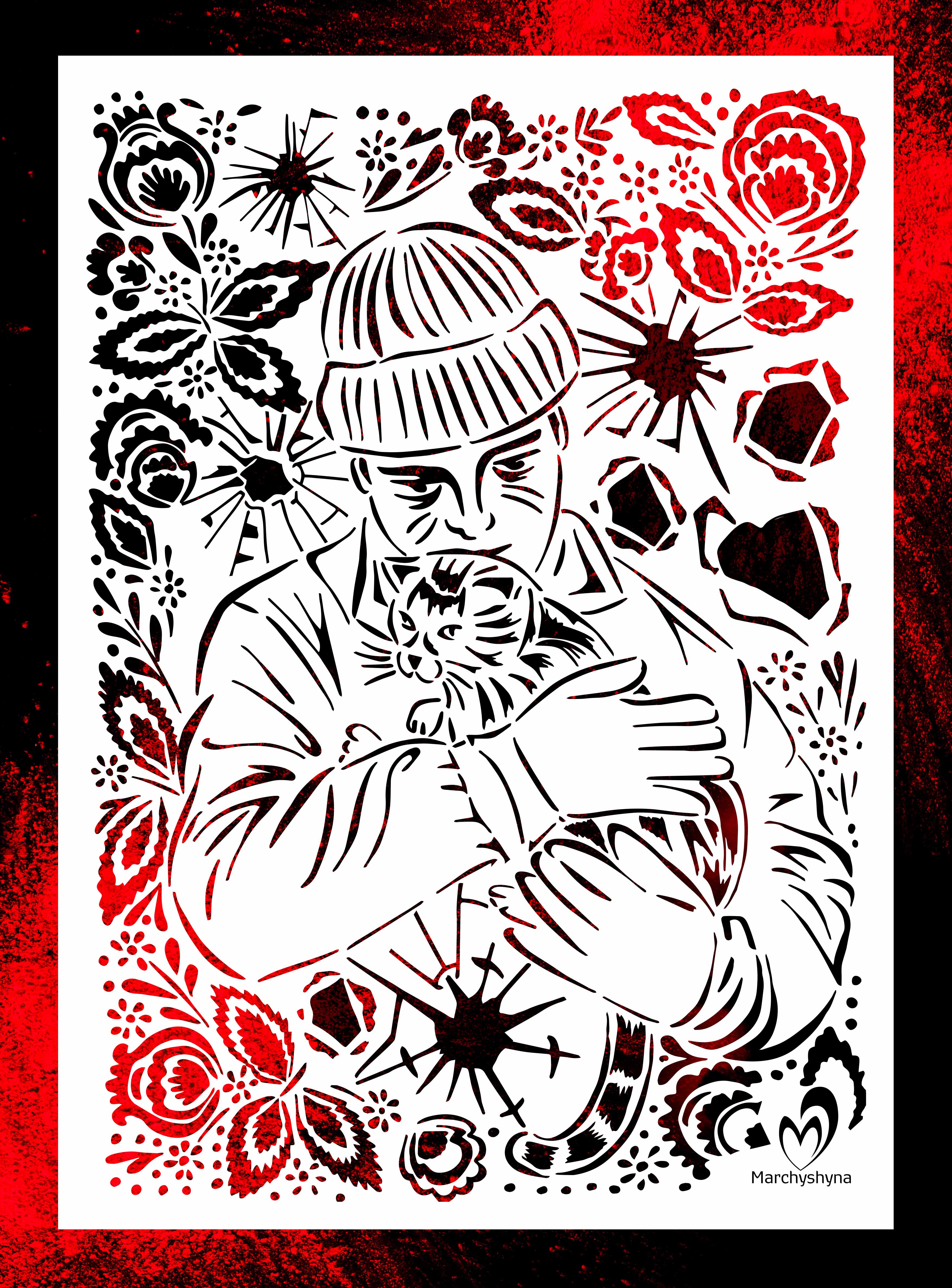
Nowadays, there are holes pierced and cut by war inside each and every one of us. They won't heal, they're bleeding. This pain needs to be heard.
This series of vytynanky (paper-cutting artworks) is about how war has changed us. They tell the stories of Ukrainian women and men, whose souls are forever “cut.”
The second story is about the wreckage of families.
This image unites all those who lost their family in the war.
What is a family? During the war, the pain of each family has its own unique and different nature because all families are different. For someone, family is a husband, a wife, children, for someone — a partner, parents, for someone, it is a cat, a dog, or a goldfish. How do we decide who should survive? How not to blame yourself for the fact that it was not possible to evacuate, to persuade, to call in time, to say important words?
In today’s Ukraine, “Good morning, how are you?” means “I love you.” The heart stops when you send and wait, holding your breath, for the answer “Hi, I'm fine, the night was quiet.” These are now our manifestations of love and affection.
Two days ago, my cat died. What is the death of a cat in a war? When thousands of people die around us? Is it selfish to cry for her for two days? I don't know… She is my family, its wreckage, which did not survive the relocation to the west of Ukraine. Did not survive… And I still wonder if it would be more humane to let her out in a village in Kyiv region where there were people and freedom, where she could find herself food… Wasn't it cruel to drag her in the car for 24 hours, after which she stopped eating and died?..
Again, this is “just a cat.” The stray cat I took in 12 years ago. The one my husband and I adopted just after the wedding. Who was with us all these years, watched the birth of our children. She was patient with their first, not always gentle, strokes of her fur. She loved sleeping with them when they grew up…
All these days, I've watched people try to take their families with them. Pack them like suitcases on a trip, save everything they can. To persuade relatives to go or hug them during explosions, sitting in the basement, holding them close because “what if it's the last time,” take the dog out of the debris, get food and necessary medicines for those who cannot move on their own…
The wreckage of lives, the wreckage of families.
The prototype of this vytynanka was an unknown man. I was never able to find his name in official sources. I found the cat's name, Marsik. On March 4, the village of Markhalivka in Fastivskyi district of Kyiv oblast was shelled with missiles. This is a small village with 150 residents and no military facilities nearby. Ordinary peaceful Ukrainians and their families live there.
This man lost his whole family in a single moment — from a missile blast. The Russian occupiers, at the push of a button, completely destroyed his house, in which the man's wife, daughter, two sons-in-law, and mother-in-law died.
The man survived. While removing the debris of the destroyed house, he found Marsik the cat, the only creature that had miraculously survived the explosion. How horribly ironic. Now this man's family is just this cat. A cat from under the debris.
The man does not know how to live on; he only hopes that the war in Ukraine will soon end. And I hope so, as does each and every one of us.
You can smell pine trees there...
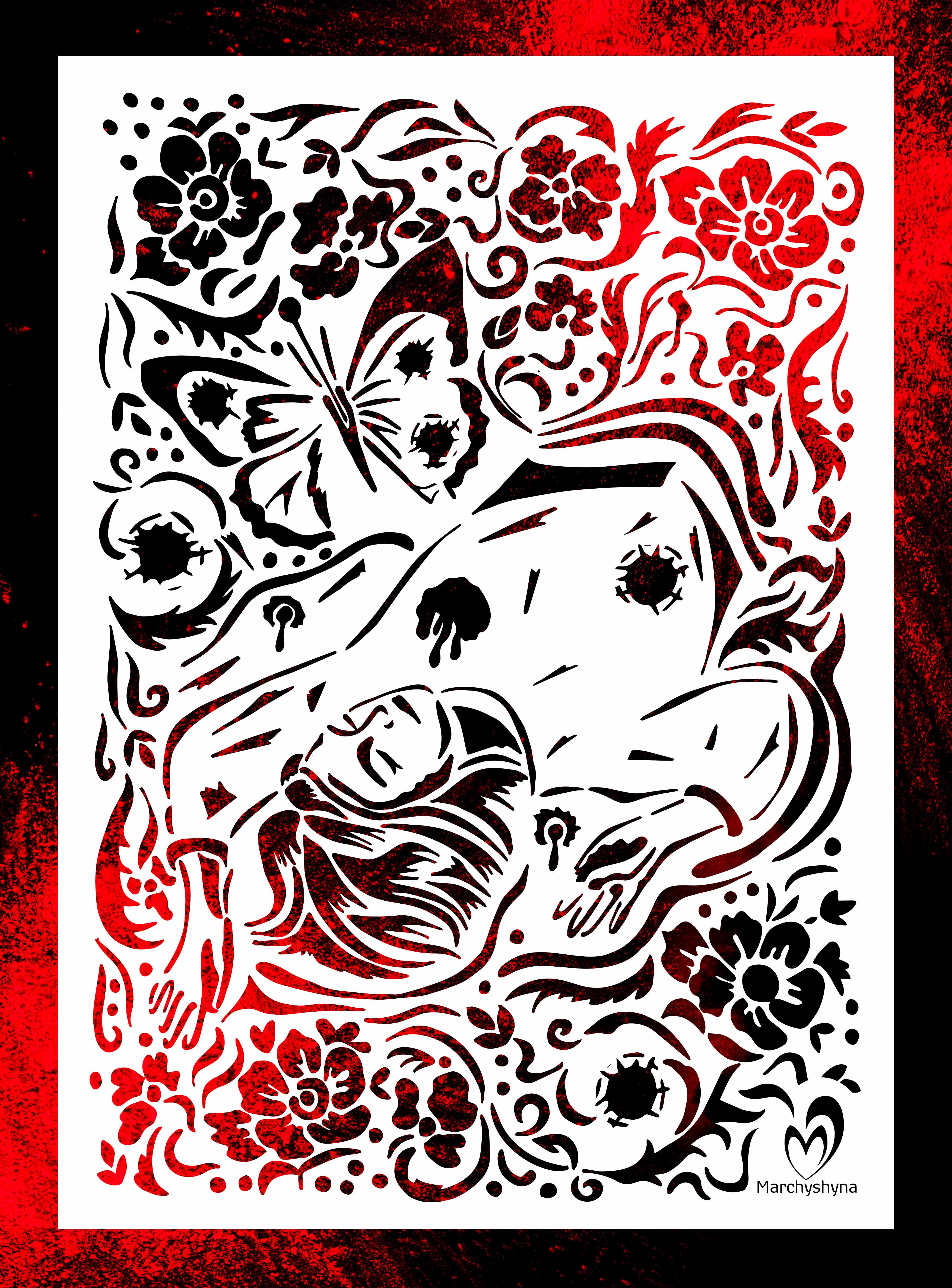
In 6th grade, our biology teacher gave us a summer assignment to dry a butterfly.
I caught a beautiful peacock butterfly. I admired its wings, and then... I put a pin in its body.
I cried for two hours watching it die. Watching it writhe in convulsions, closing and opening its wings, trying to get away from the pin going through its body. I was crying because I realized I had no reason to kill it. The butterfly had its own life, its own cycle, set by nature, and I killed it for no reason. I was not using it to satisfy my hunger, feed my children, protect my garden from pests. No, I was just curious.
For the second day now, my heart breaks ... When I look at the photos of Bucha, Irpin, Hostomel.
All these towns are so cozy, so close to my heart... The park in Bucha where we went for a walk with the parents of our goddaughter, their home where we celebrated said goddaughter’s birthday. The house of my aunt and uncle, who escaped from Ilovaisk in 2014, having lost their home, and now they have lost their new home again in Irpin — and again because of the Russians. So many residents of these towns near Kyiv were forcibly relocated from the Donbas after 2014...
Only pine trees in the pictures make these streets at least somewhat recognizable. I loved these pine trees and felt really bad when developers uprooted them for the sake of new buildings... Now, there are no more buildings or people — only ruins and pine trees.
Our family, along with two others, were also hiding near Kyiv. Here, as in real Russian roulette, in our case, the revolver drum spun an empty cartridge. We got “lucky” with our choice of the village, while hundreds of Ukrainians who now lie dead, raped, tortured, cut up, were not so “lucky.”
I no longer have an understanding of what is happening. Before, I could analyze the causes of the Russian aggression, the desire to seize territory, power, but now, I see no reason other than exterminating Ukrainians.
I do not know how these creatures continue to walk, eat, live. How a woman somewhere in Samara receives a parcel from her husband and, without a shadow of a doubt, wears the clothes of a woman who is currently buried somewhere in Hostomel. How someone’s father in Novgorod watches TV on a TV set from a man strangled and thrown in a manhole in Irpin — the TV set sent by his son who went to invade Ukraine. And this man does not ask, “Son, where did you get this?”
How do they exist? All this mass, all this amount? I cannot call them a people, a population, or a horde, because all these formations have the characteristics of people, while our invaders no longer have those characteristics.
It hurts me that there are still countries that can support this. It hurts me that there are still countries that could stop this, but are not making the necessary efforts. It just hurts.
I can't choose one single story for the prototype of this vytynanka, because each of them is scarier than the next. No victim can ever be forgotten.
Slices of bread
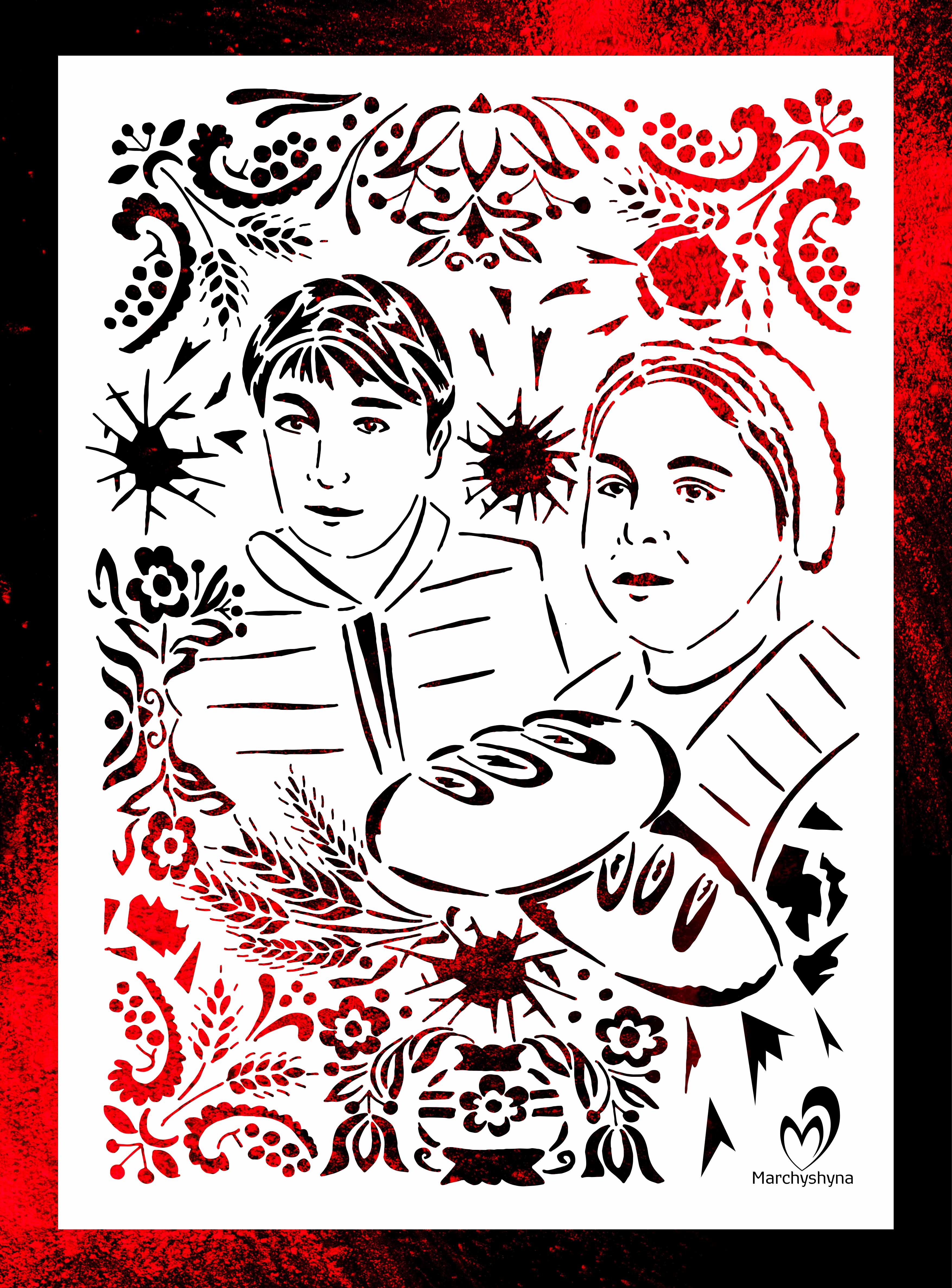
What kind of bread do you like? I love ciabattas, crispy, fresh, straight from the bakery. Or buckwheat baguette, the one that when you start eating, it's so delicious that you can barely think about anything else.
My mother never throws out bread. She always gently sweeps bread crumbs from the table with her palm. If bread gets a bit stale, she’ll use it for croutons or for meat patties. She’ll always find good use for extra flour remaining after she makes dough, so she wouldn’t have to toss it out. I also kept such “leftover flour” in little bowls in kitchen cabinets — I would put it there and forget about it. And then once, after dropping such a bowl over his head, twice, my husband asked me whether I couldn’t simply throw out those two extra spoonfuls of flour. I don’t know — I just can’t. I'm so used to it. I can't explain why. That’s the way it’s done in my family.
In Ukraine, we view bread as life. This attitude has been ingrained in our people since the Holodomor, the Famine, which was staged by the ancestors of the same Russians who are now killing our people because they are Ukrainian.
Did I think this was ingrained in me so deeply? In a person from Kyiv, who often doesn’t eat bread at all, and when she does, it’s something fancy from the bakery?
The war shows many things we may have not realized.
At the beginning of the war, I learned how to bake bread. Not a ciabatta or a baguette, but a yeast loaf on a simple aluminium frying pan, which I put on the miniature electric stove because hiding in a village near Kyiv, we were saving a gas cylinder in case there was a blackout.
I burned the first loaf on both sides, it was black and charred. We cut the charred parts and ate it. Because you cannot toss out bread, especially not during the war.
Gradually, my bread was looking more and more like actual bread. There were 14 people gathered at the table, exactly half of them children. We gave them a loaf — divided it into seven equal pieces. Nothing ever remained for adults. If one of the children didn’t want their piece, the others would quietly divide it among themselves. It was scary to watch.
That’s why I feel no sympathy looking at empty shelves in Russian supermarkets, at Russians fighting over sugar or getting turned away from restaurants all over the world. This is not enough for me. I want their children to taste half-burnt bread as well.
This vytynanka is dedicated to all those who, despite the terrible conditions, prepare food, bake bread, deliver and distribute food to people who protect us, and to those who cannot get food on their own. So many such stories around us; so many wonderful people. It is their frontline.
Lesia and Tania from Irpin inspired the work. Under fire, with flashlights, without water or power supply, the women secretly baked bread for almost a month to feed the people who inadvertently became hostages of the Russian occupiers. Diesel fuel in the generator was spent only on bread. They refused to evacuate because they understood that lives depended on them.
They baked as many loaves at once as they could, 80 of them. The women worked every day until they ran out of flour and fuel in the generator. Then the Ukrainian military started supplying them with what was necessary to carry on, under constant fire.
The women did not hide in the shelter and did not go home. They lived in a supermarket, where they baked bread, and they had no time for anything else.
Because every Ukrainian person knows that if there is bread, there will be life.
